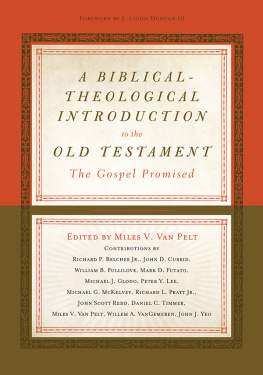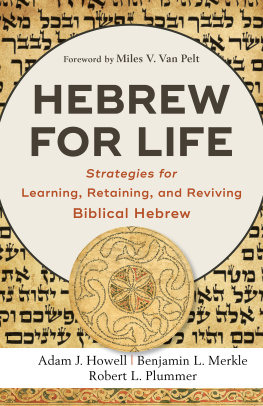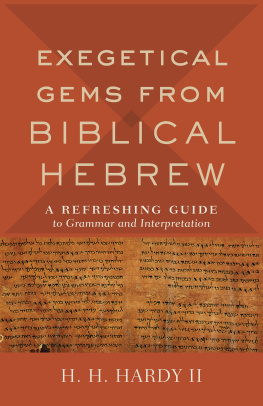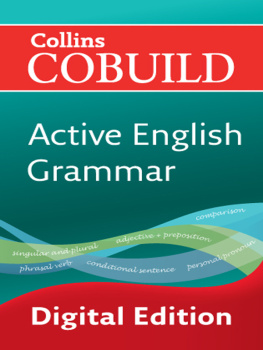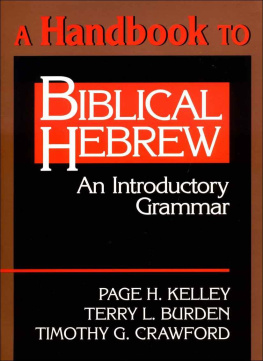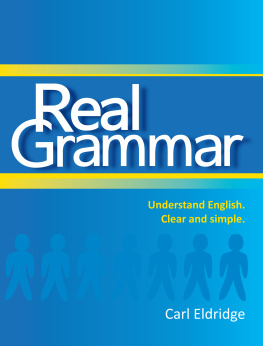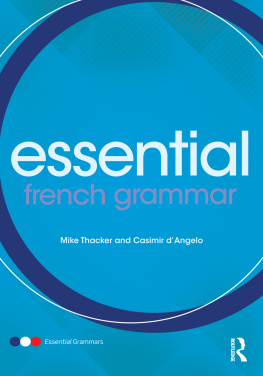ZONDERVAN
English Grammar to Ace Biblical Hebrew
Copyright 2010 by Miles V. Van Pelt
Requests for information should be addressed to:
Zondervan, 3900 Sparks Drive SE, Grand Rapids, Michigan 49546
ePub Edition July 2018: ISBN 978-0-3101-0087-4
Library of Congress Cataloging-in-Publication Data
Van Pelt, Miles V., 1969
English grammar to ace biblical Hebrew / Miles V. Van Pelt.
p. cm.
Text in English; some examples in English and Hebrew.
ISBN 978-0-310-31831-6 (pbk.)
1. English language Textbooks for foreign speakers Hebrew. 2. English language Grammar, Comparative Hebrew. 3. Hebrew language Grammar, Comparative English. I. Title.
PE1130.H5V35 2010
428.2'4924--dc22
2009040176
Any Internet addresses (websites, blogs, etc.) and telephone numbers printed in this book are offered as a resource. They are not intended in any way to be or imply an endorsement by Zondervan, nor does Zondervan vouch for the content of these sites and numbers for the life of this book.
All rights reserved. No part of this publication may be reproduced, stored in a retrieval system, or transmited in any form or by any means electronic, mechanical, photocopy, recording, or any other except for brief quotations in printed reviews, without the prior permission of the publisher.
Cover design: Mark Veldheer
Interior design: Miles V. Van Pelt
Information about External Hyperlinks in this ebook
Please note that footnotes in this ebook may contain hyperlinks to external websites as part of bibliographic citations. These hyperlinks have not been activated by the publisher, who cannot verify the accuracy of these links beyond the date of publication.
For Hardy Warren
former reprobate, now saint
my friend
Contents
1. Alphabet
Time to Learn about Your ABCs (BBH 1)
2. Vowels
Time to Check the Oil! (BBH 2)
3. Nouns
Name It, and Claim It (BBH 4)
4. The, And, Of
Are You Kidding Me? (BBH 5, 10)
5. Prepositions
Watch Where You Sit (BBH 6)
6. Adjectives
Our Theology Requires Modification (BBH 7)
7. Pronouns
Grammatical Stunt Doubles (BBH 8, 9, 19)
8. The Sentence
Parts Is Parts! (BBH 23)
9. Mood, Tense, Aspect
Understanding Verb Psychology (BBH 1235)
10. Person, Gender, Number
Understanding Verb Reference (BBH 1235)
11. Voice and Action
Understanding Verb Verbalization (BBH 1235)
12. Imperative
Clause Commandos (BBH 18)
13. Infinitives
To Be or Not To Be, That Is the Infinitive (BBH 20, 21)
14. Participles
Those Verbs That End with -ING (BBH 22)
Thanks to Verlyn Verbrugge and the Zondervan team. It is always a pleasure to work with friends. Our collaborations now span eighteen years. I still remember the first project; editing Bills analytical Greek lexicon in 1991, and getting paid with books. Those were the days!
There were several people who read this book at various stages in the process. My wife, Laurie, even in the midst of her busy schedule, took time to read several chapters for me. It was also encouraging to have my son Ben help with the editing. He can outspell me any day of the week (at age eleven!), and he made many helpful suggestions. Thanks are also due to Jonathan Kiel and Josh Walker, my friends and faithful teaching assistants. Not only did they help with editing, but they also shouldered a heavy work load during the 2009 summer Greek courses at RTS, freeing me to write in the afternoons. Thanks also to Bob Banning for his expertise in English grammar.
Thanks to Reformed Theological Seminary in Jackson, Mississippi, for providing the environment to study, teach, and write. RTS is a great place to work. Thanks also to my family: Laurie, Ben, Kacie, Madie, and Max. You provide the perfect context for the work of my calling. Together we give thanks to our Lord.

WHY THIS BOOK?
I have the uncommon privilege of teaching all three biblical languages at Reformed Theological Seminary in Jackson, Mississippi. In each course, I continue to observe that students are not simply struggling to learn Hebrew, Aramaic, or Greek; they are also struggling to learn English. Now, lets be clear. Most of my students already speak the English language, and so they are not struggling to communicate in English, or even to understand English vocabulary. Rather, I see my students struggling with the basic concepts of English grammar. The categories of pronoun and antecedent, direct and indirect , transitive and intransitive, continue to stupefy even the most enthusiastic student. So I often find myself teaching a fourth foreign language in the classroom, the language of English grammar.
A knowledge of both English and Hebrew grammar is essential for your studies. A foreign language like Hebrew consists of more than just foreign words. It also contains foreign grammar and syntax. Good translations require more than the translation of words. They also require the translation of grammar and syntax. You will discover that translating a Hebrew word into an English word is not that difficult. Translating a Hebrew sentence into an English sentence, however, is much more difficult. Translating sentences requires the translation of grammar and syntax. If your knowledge of English grammar is poor, then your ability to translate Hebrew into English will suffer. And, if you cant translate Hebrew into English, then your ability to understand and interpret the biblical text will be hindered, and this is what we want to avoid.
So, this little book is intended to provide Hebrew students with a very basic introduction to English grammar. Please understand, however, that this introduction is not comprehensive, but rather selective. The grammatical presentations that follow are limited and shaped by the needs of those students who are working to learn biblical Hebrew.
It is also worth noting that many students who study biblical languages in an English-speaking context may not be native speakers. Many of my students, for example, are from South Korea or Africa. I hope that this book will serve their needs too.
HOW TO USE THIS BOOK
Depending on your needs, there are a number of different ways in which this book may be used. One approach would be to read the entire book and complete the exercises in each chapter before you begin working through a Hebrew grammar. This approach would provide a comprehensive summary of English grammatical concepts necessary for the study of Hebrew grammar.
Another option would be to work through the nominal material in in preparation for studying the Hebrew verbal system.
Finally, you may have noticed that each chapter listed in the table of contents contains references to chapters in BBH. You can simply work through this book in conjunction with the study of Hebrew, topic by topic. But this is simply another suggestion. The design of the book and the references contained within each of the chapters are intended to provide maximum flexibility and adaptability.
TIPS FOR STUDYING HEBREW
If you are preparing to learn biblical Hebrew, allow me to offer a few words of language learning wisdom. I have watched many students succeed and others fail. There are some common characteristics for both groups. If you would like to succeed, consider the following:


